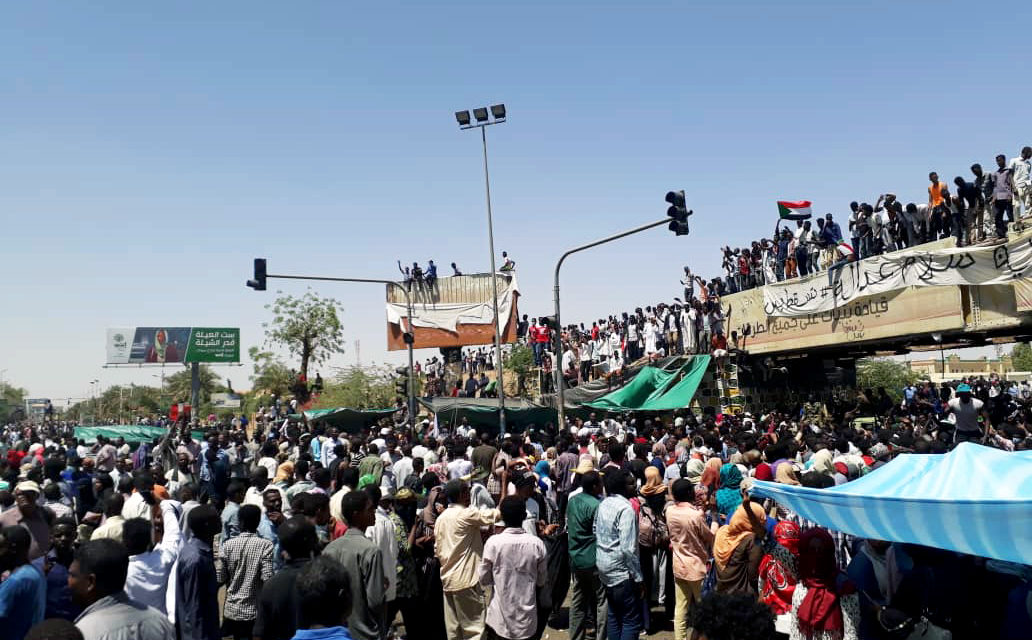Protestors in front of the Sudanese Army General Command. (cc) AlAdwaa.Online | Tarig Osman | July 2019
In April 2019, the Sudanese people ousted their long-ruling, ageing autocrat Omar al-Bashir – a victory of people from all walks of life. However, Sudan’s post-Bashir transformation seems stifled by, as some argue, enduring networks of power and counter-revolutionary forces.
Following the 30-year-rule of Omar al-Bashir in Sudan, institutions, inside and outside of government, and established networks of power operating independently of the state’s political leadership, in pursuit of their own agenda and goals, are so entrenched that real change could be challenging to bring about.
Political options become limited, as this body of people and institutions, typically current and former influential members of government agencies, the military and the private sector are believed to be involved in the secret manipulation or control of government policy – creating a so-called deep state.
While some people argue that the deep state exists in Sudan and that it constitutes a challenge to Prime Ministers Abdalla Hamdok’s government, others say that the term deep state is merely a pretence, coined to blame potential government failures in providing services or accomplishing tasks to be realised during the transitional period on something.
“The deep state exists and must be dealt with because it is manipulating the economy”.
Wajdi Saleh
In September 2019, the Akhir Lahza newspaper quoted Wajdi Saleh, a spokesperson for the Forces of Freedom and Change alliance (FFC), claiming the presence of a deep state in Sudan. However, he later corrected this statement, saying there is a “hidden state in some state institutions”. On September 30, 2019, Wajdi contradicted his correction, telling the Intibaha newspaper that “the deep state exists and must be dealt with because it is manipulating the economy”.
Sudan’s Finance Minister Ibrahim al-Badawi accused counter-revolutionary members of manipulating the US dollar price in Sudan by increasing demand for foreign currencies. “There is an accelerated and high pace work done by the counter-revolution in the purchase of dollars and foreign currency,” al-Badawi told the Al-Sudaniya publication, suggesting a coordinated effort by counter-revolutionary forces.
What is the deep state?
There are various interpretations of what Sudan’s deep state is. However, all these interpretations have one thing in common – Sudan’s deep state is composed of individuals and groups from the former regime, who have common interests and work together to preserve them.
Idris Eldoma, a political science professor at the Islamic University of Omdurman, said that “the former regime is present in government institutions”, trying to “prevent the continuity” of the transitional government.
Dr Hamzah Awadallah, a media professor at the Academy of Communication Sciences at the Islamic University, agrees with Eldoma, saying that “the deep state, individuals and groups with common interests, work together to undermine and thwart the revolution”.
“The deep state, individuals and groups with common interests, work together to undermine and thwart the revolution”.
Dr Hamzah Awadallah
Hatim Elias, a lawyer and political activist, told AlAdwaa.Online that “the deep state is interests created by the former regime among the people loyal to it,” mainly from the private and the security sector, adding that they “have benefited from the state apparatus”.
On his Facebook page, Madani Abbas Madani, Sudan’s Minister of Industry and Trade, said that “the deep state is not only a political organisation but also a number of relations and interests that had been entwined during the past period inside and outside the civil service. It is a pattern of behaviour in civil service characterised by inefficiency and ineffectiveness tempting people to improperly access public money.”
Hatim Elias warned of the deep state’s hostility to democracy. However, he believes that “this issue should not be a concern for the people, because a big part of the deep state has become known and has lost its influence”.
A danger of Sudan’s current deep state discourse, according to Dr Hamza Awadallah, is that it provides an excuse for the transitional government should they fail to accomplish set tasks during the transitional period, or for the “failure in providing services”.
Eliminating enduring networks of power
Professor Idris Eldoma said that “the former regime is working hard to disrupt the transitional government and is trying to convince the public that this government is a failure”. He added that this “deep state is present in many countries. Egypt is one of them. It has succeeded there but failed in other states.”
He stressed that dealing with the deep state should be “through real accountability, dismantling the former regime, dissolving the national conference and confiscating its property, and putting the security apparatus under the administration of the prime minister”.
Minister Madani said there is a lot to be done in order to fight the deep state and eliminate the old networks of power. “If we acknowledge that the former regime had deeply dominated all levers of the state and lawlessly abused them for the last 30 years, it would not be logical to think that this structure can be dismantled within a few days.”
Madani said that “the path to dismantling the former regime’s elements is a daily course of action that should be taken along with the building of a state that coordinates the aspirations of the revolution – a state of freedom, justice and equality”.
“It would not be logical to think that this structure can be dismantled within a few days.”
Madani Abbas Madani

